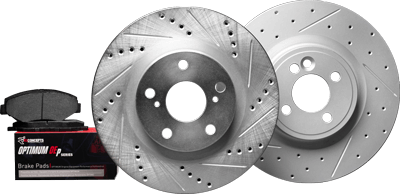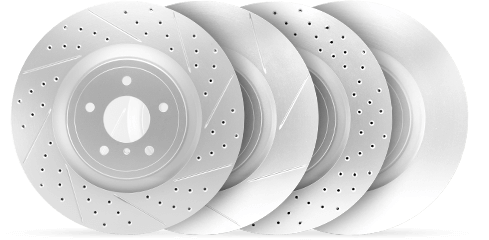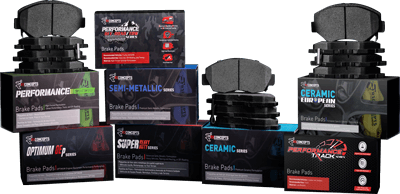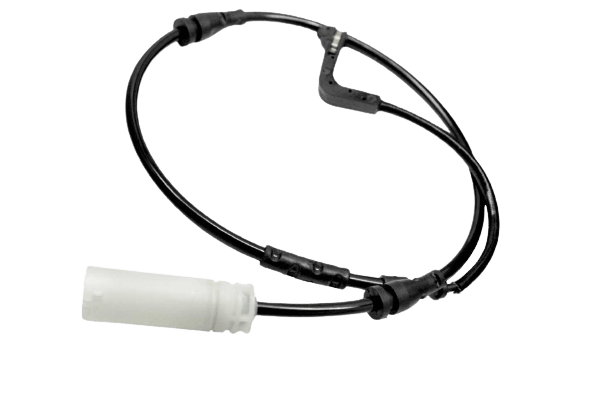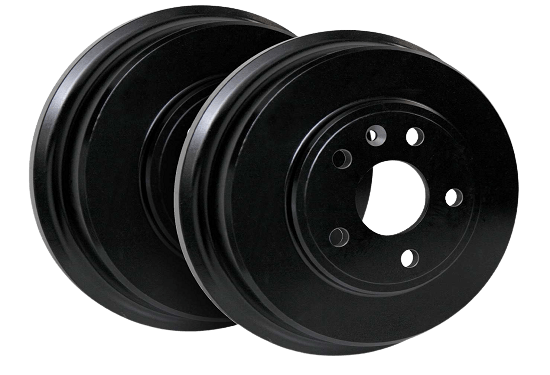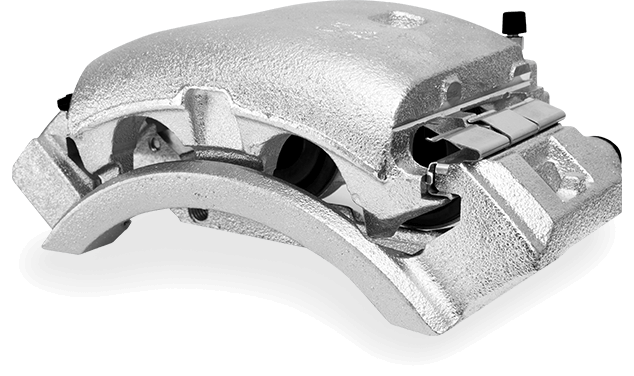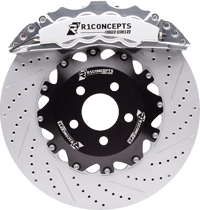
Looking to replace the brake pads on your 2017 Nissan Rogue? This guide covers the best brake pad options, replacement tips, cost insights, and where to buy high-quality brake pads tailored to your vehicle’s needs.
Key Takeaways
- Brake pads are essential to the 2017 Nissan Rogue’s braking system, directly affecting safety and performance. Timely replacement is crucial to prevent increased stopping distances and reduced control.
- Various types—including OEM Aftermarket, Ceramic, and High Friction Formulation—cater to specific driving conditions, offering unique benefits in longevity, noise reduction, and braking power.
- Regular inspections and timely maintenance are vital for preserving the health of your brake system. Look out for signs of wear such as squealing, vibrations, or longer stopping distances to avoid damage to other components.
Understanding Brake Pads for the 2017 Nissan Rogue
Brake pads are a critical component of your Nissan Rogue’s braking system. They generate the friction needed to slow or stop your vehicle safely. Over time, brake pads wear down, and if not replaced in time, can lead to longer braking distances and compromised vehicle control.
To maintain safe and efficient braking, replacing worn brake pads promptly is essential. Worn pads not only affect performance but also place additional strain on other parts of the braking system, such as rotors and calipers.
For the best results, consider using genuine Nissan brake pads or high-quality aftermarket alternatives that ensure compatibility and restore original braking performance.
Types of Brake Pads for the 2017 Nissan Rogue
Brake pads for the 2017 Nissan Rogue come in several types, each designed for different driving styles and road conditions. The main options include:
1. OEM Aftermarket Brake Pads
Designed to meet or exceed original factory specifications, OEM aftermarket pads are a cost-effective solution that delivers reliable performance and a precise fit. They’re ideal for drivers who want the feel and function of factory pads without paying dealership prices.
2. Ceramic Brake Pads
Ceramic pads are known for their quiet operation, long lifespan, and minimal brake dust production. They’re perfect for everyday driving and provide a smooth, clean braking experience with reduced maintenance needs.
3. High Friction Formulation Brake Pads
Engineered for enhanced braking power, especially under heavy loads or aggressive driving conditions, these pads are ideal for those who want maximum stopping performance. They handle higher temperatures well and are suited for drivers who frequently tow or drive in mountainous terrain.es of usage.
OEM Aftermarket Series

Aftermarket OEM brake pads for the 2017 Nissan Rogue are engineered to meet original equipment specifications, delivering performance and compatibility that closely mirrors factory-installed pads. These pads are an ideal replacement for drivers seeking to maintain the quality driving experience offered by the original components.
The R1 Optimum OEp Brake Pads are particularly well-suited for vehicles like the 2017 Nissan Rogue, offering enhanced durability, minimal noise, and reduced brake dust—all essential features for both performance and ease of maintenance.
Brake pad kits featuring these models typically include shims, clips, and necessary mounting bolts, ensuring a hassle-free installation. These additional components help maintain the functionality and reliability of your vehicle’s braking system, making the upgrade seamless and effective.
Ceramic Series

Ceramic Series brake pads for the 2017 Nissan Rogue stand out for producing significantly less brake dust, helping to keep your wheels cleaner compared to standard pads. These ceramic-based components are also known for their quieter braking performance, enhancing overall driving comfort by minimizing noise during stops.
One of the key advantages of Ceramic Series brake pads is their impressive longevity, delivering long-lasting performance and reliability—ideal for drivers who value low-maintenance vehicle care. Their durable composition, combined with reduced noise and minimal dust emissions, makes these pads an excellent choice for daily driving. They provide a consistent, smooth braking experience while extending the lifespan of both the pads and the rotors.
High Friction Formulation Series

Designed with a high friction formulation, these brake pads deliver exceptional stopping power by optimizing friction levels for maximum effectiveness. They are constructed from advanced materials that enhance heat dissipation and maintain resistance to brake fade, even under demanding conditions such as racing or off-road driving.
The performance of these high friction formulation brake pads for the 2017 Nissan Rogue remains consistent across various driving situations, providing a responsive and confident pedal feel at all times. Their ability to operate efficiently within a wide temperature range—from 300°F to 1,100°F—underscores their durability and adaptability, especially in environments that place significant stress on braking systems.
Factors Affecting the Lifespan of Brake Pads
Brake pads on the 2017 Nissan Rogue have a variable lifespan, typically ranging between 30,000 and 70,000 miles, depending largely on individual driving habits. Frequent hard braking, aggressive driving, stop-and-go traffic, and navigating rough or hilly terrain can all contribute to faster brake pad wear compared to smoother highway driving.
Vehicle weight is another critical factor. Heavier vehicles generally experience faster wear on brake components, including pads. For this reason, it is recommended to inspect your brake pads approximately every 10,000 miles to assess their thickness and overall condition. When pad thickness drops below 3mm, prompt replacement is essential to maintain optimal braking performance and ensure road safety.
Beyond maintenance, external factors such as terrain and road conditions also influence brake pad wear. Being aware of these factors promotes better driving habits and helps ensure timely maintenance, extending the life of your braking system.
Recommended Replacement Frequency
Signs that your brake pads may need replacement include squealing or grinding noises, vibrations, or a burning smell when braking. Conducting regular inspections and replacing pads as needed can prevent braking system failure and enhance safety.
Timely replacement also helps protect other components, such as rotors and calipers, from damage. For instance, ceramic brake pads offer better durability than organic or semi-metallic alternatives, resulting in fewer replacements and better long-term value.
Proper maintenance also helps prevent metal-on-metal contact, which can lead to costly repairs. This underscores the importance of regular care and replacement.
Cost of Brake Pads for the 2017 Nissan Rogue
A full set of brake pads for the 2017 Nissan Rogue typically costs between $25 and $65, depending on the brand and material. The type of material used—organic, semi-metallic, or ceramic—affects both performance and pricing. While ceramic pads may carry a higher upfront cost, their extended lifespan and reduced maintenance needs often provide better overall value.
Installation Hardware and Process
Installing new brake pads involves several key steps: removing the wheel and caliper, taking out the old pads, installing the new ones, and reassembling all parts. It’s essential to lubricate the caliper slides and use torque specs recommended by the manufacturer to ensure everything is properly secured.
It’s also critical to inspect the condition of your rotors during installation. Replace them if they show signs of damage or excessive wear to maintain peak braking performance and avoid future issues.
Included Hardware
Most brake pad kits come with the essential hardware needed for installation—shims, clips, and bolts.
- Shims reduce noise and vibration.
- Clips hold the pads in place securely.
- Bolts ensure all components are fastened correctly.
Having the right hardware improves both the accuracy of the installation and the efficiency of your vehicle’s braking system.
No Modifications Required
Brake pad kits for the 2017 Nissan Rogue are designed for direct fitment, meaning they install easily without requiring any modifications to the existing brake system.
Benefits of Using Quality Brake Pads
High-quality brake pads enhance the driving experience by improving responsiveness, reducing noise, and increasing braking efficiency, especially in emergency situations. They often lead to shorter stopping distances and a more stable braking experience.
Maintaining good brake pads also helps deliver a smoother pedal feel and reduces brake dust, keeping your wheels cleaner. Ceramic brake pads, in particular, are known for quiet operation, durability, and long service life—making them a top choice for everyday use.
Summary
Choosing the right brake pads for your 2017 Nissan Rogue is essential to ensure both safety and performance. Understanding the differences between OEM Aftermarket, Ceramic, and High Friction Formulation pads helps you select the best option based on your driving habits and needs.
Routine inspections and timely replacements not only improve safety but also help prevent damage to other components, saving you money over time. Investing in high-quality brake pads and adhering to recommended maintenance practices will help keep your Rogue running smoothly and safely for years to come.
Frequently Asked Questions
What are the signs that my brake pads need to be replaced?
If you hear unusual noises, feel vibrations, or notice a burning smell while braking, your brake pads may need replacement. Prompt attention is critical for safety.
How often should I inspect my brake pads?
Brake pads should be inspected every 10,000 miles to monitor their thickness and condition. Routine maintenance improves both performance and safety.
What is the price range for brake pads for the 2017 Nissan Rogue?
A full set typically costs between $25 and $65, depending on the brand and material. This gives you a solid baseline for budgeting your maintenance.
What are the benefits of using ceramic brake pads?
Ceramic pads produce less dust and noise, offer greater durability, and have a longer service life, making them ideal for consistent performance and lower upkeep.


